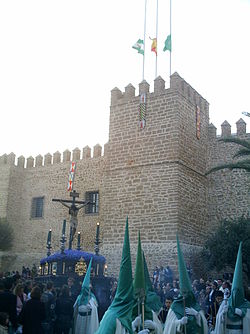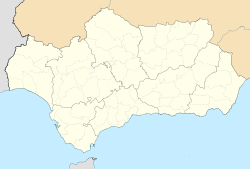Rota, Cádiz
| Rota | |||
|---|---|---|---|
| Town | |||

Castillo de Luna during Good Friday
|
|||
|
|||
 Location of Rota |
|||
| Location in Andalusia | |||
| Coordinates: 36°37′N 6°21′W / 36.617°N 6.350°WCoordinates: 36°37′N 6°21′W / 36.617°N 6.350°W | |||
| Country |
|
||
| Municipality | Cádiz | ||
| Government | |||
| • Mayor | José Javier Ruiz Arana PSOE | ||
| Area | |||
| • Total | 84 km2 (32 sq mi) | ||
| • Land | 84 km2 (32 sq mi) | ||
| • Water | 0.00 km2 (0.00 sq mi) | ||
| Population (2005) | |||
| • Total | 26,792 | ||
| • Density | 319.0/km2 (826/sq mi) | ||
| Time zone | CET (UTC+1) | ||
| • Summer (DST) | CEST (UTC+2) | ||
| Website | www |
||
The town of Rota is a Spanish municipality located in the Province of Cádiz, Andalusia. Its surface area is 84 km ² and is bordered by the towns of Chipiona, Sanlúcar de Barrameda and El Puerto de Santa María. It is located near the city of Jerez de la Frontera and is 36 kilometers away from the provincial capital, Cadiz. In the year 2009 had 28,516 inhabitants, with a density of 339.44 inhabitants / km ². It belongs to two associations, the Association of Municipalities of Cadiz Bay along with the municipalities of Cadiz, Jerez de la Frontera, El Puerto de Santa María, San Fernando, Chiclana and Puerto Real; and the Association of Municipalities of the Lower Guadalquivir that comprises municipalities of Northwest Coast of Andalusia.
Located along the Bay of Cádiz in the Atlantic Ocean, it is halfway between Portugal and Gibraltar, is predominantly a tourist town, a vacation/holiday destination for travelers from all over Europe. During the low season, its main business activity is the fishing industry. In the municipality is located the Naval Station Rota, which is the largest source of employment to the municipality.
Archaeological evidence suggests that there was a Bronze Age settlement on the present site of Rota. The current town was founded by the Phoenicians at approximately the same time as Cádiz. Rota is assumed to be the same city known as Astaroth of the Tartesian empire. It later passed to the Romans, who knew the town as Speculum Rotae.
Following the arrival of the Moors in Spain, the city became known as Rabita Rutta ("watchtower of Rota"), from which it derives its present name. From 1248 onwards, the Moors were gradually expelled from Spain, and the city became Christian. In 1297, Sancho IV awarded the town to Alonso Pérez de Guzmán in honour of his defence of Tarifa. Later, Pérez de Guzmán gave it to his daughter, Isabel, as a wedding present when she married Fermin Ponce de León, Maestre of Alcántara and First Lord of Marchena. Construction of the Castillo de la Luna (Castle of the Moon) had begun in 1295, two years prior to the bequest to Pérez de Guzmán, as part of Sancho IV's effort to develop strong coastal defenses, especially near the entrance to the Mediterranean Sea. During the Middle Ages, the town was an important port for trading with North Africa. In 1780 the 11th Duke of Arcos died without issue, and the city was rendered to the Duke of Osuna.
...
Wikipedia



